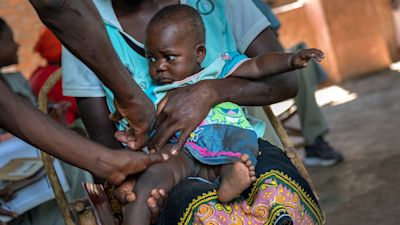World's first malaria vaccine approved by WHO experts in 'breakthrough for science'

How the breakthrough malaria vaccine will be a "life-saver" for some of the most vulnerable children, explains ITV News Correspondent John Ray
The World Health Organization (WHO) has approved the world's first malaria vaccine in a "historic moment" in the fight against the disease.
Experts have recommended the RTS,S malaria vaccine among children in sub-Saharan Africa and other high risk areas.
Malaria remains a primary cause of death and childhood illness in sub-Saharan Africa - a child dies from the disease every two minutes and more than 260,000 African children die every year.
WHO Director-General Dr Tedros Adhanom Ghebreyesus said: "This is a historic moment. The long-awaited malaria vaccine for children is a breakthrough for science, child health and malaria control.
"Using this vaccine on top of existing tools to prevent malaria could save tens of thousands of young lives each year."
The WHO said the jab has a strong safety profile, is feasible to deliver and could save tens of thousands of lives a year.
At a glance: Malaria in numbers
There are 200 million cases a year
400,000 people die from malaria a year
A child dies every two minutes from the disease
The vaccine will require up to four doses
Babies will be vaccinated from five months
Jab is 30% effective
800,000 children were involved in the pilot programme
The WHO said its decision was based on a pilot programmes across Ghana, Kenya and Malawi where the jab was administered to 800,000 children since 2019.
Dr. Matshidiso Moeti, the WHO’s Africa director said: “Today’s recommendation offers a glimmer of hope for the continent which shoulders the heaviest burden of the disease and we expect many more African children to be protected from malaria and grow into healthy adults."
ITV News Health Editor Emily Morgan explains who will benefit the most from this vaccine
How the vaccine will help save tens of thousands of lives
The malaria vaccine known as Mosquirix was developed by GlaxoSmithKline in 1987 and is the first to be authorised.
It provides a 30% reduction in deadly severe malaria and requires up to four doses in children aged five months and older.
GSK said that when the jab is given in combination with seasonal administration of antimalarial drugs, the vaccine “lowers clinical episodes of malaria, hospital admissions with severe malaria, and deaths by around 70%”.
It has been estimated that the vaccine, which has been in the making for three decades, could save “millions” of lives.
When will the vaccine be rolled out?
It is unclear when the first malaria vaccine will be administered, but Gavi, the vaccine alliance, said the pilots showed that the vaccine can be successfully rolled into existing immunisation programmes.
It said it will work with other partners on how to finance the new malaria vaccination programme.
GSK said it is “working with partners to develop solutions to ensure equitable and long-term access to the RTS,S vaccine for the people who need it”.
The company donated 10 million doses for the pilot scheme, which began in 2019 to test the feasibility of the rollout, and it has also committed to supply up to 15 million doses annually at no more than 5% above the cost of production.
Even though the vaccine does not have a high efficacy rate, scientists say it will still have . major impact in helping to fight the disease and save lives.
“This is a huge step forward,” Julian Rayner, director of the Cambridge Institute for Medical Research, said - who was not part of the WHO decision.
“It’s an imperfect vaccine, but it will still stop hundreds of thousands of children from dying.”
Rayner said that the vaccine’s impact on the spread of the mosquito-borne disease was still unclear, but pointed to the coronavirus vaccines as an encouraging example.
“The last two years have given us a very nuanced understanding of how important vaccines are in saving lives and reducing hospitalizations, even if they don’t directly reduce transmission," she added.
Sian Clarke, co-director of the Malaria Centre at the London School of Hygiene and Tropical Medicine, said the vaccine would be a useful addition to other tools against the disease that might have exhausted their utility after decades of use, like bed nets and insecticides.
“In some countries where it gets really hot, children just sleep outside, so they can’t be protected by a bednet,” Clarke explained. “So obviously if they’ve been vaccinated, they will still be protected.”
Clarke added that in the last few years little significant progress has been made against malaria. “If we’re going to decrease the disease burden now, we need something else.”